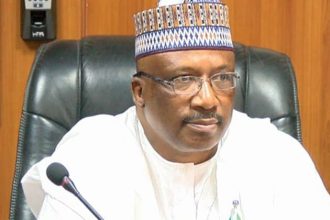President of the Nigeria Academy of Pharmacy, Prof. Lere Baale, has called for a stronger research and manufacturing ecosystem to drive pharmaceutical innovation and health security in Nigeria.
Speaking at the Health Writers Association of Nigeria (HEWAN) Annual Conference on Wednesday, Baale said Nigeria must invest strategically in scientific infrastructure, local drug production, and regulatory harmonisation to ensure sustainable access to quality medicines.
In his thought leadership presentation titled “Drug Research and Development: From Laboratory to the Patient,” Baale described drug Research and Development (R&D) as a journey of transformation, where ideas become innovations and science becomes service to humanity.
He noted that the process is one of the most complex and consequential undertakings of human progress, typically taking 10 to 15 years and costing over $2 billion to bring a single medicine to market.
Outlining the pathway from discovery to delivery, Baale highlighted six critical stages of drug development: discovery and preclinical research, clinical development, regulatory review, manufacturing, emerging frontiers in artificial intelligence and genomics, and the human dimension of compassion and ethics.
He explained that the process begins when scientists identify biological targets and screen thousands of compounds using advanced technologies such as AI and computational modelling, before proceeding through a rigorous, three-phase human trial process to ensure safety and efficacy.
Baale affirmed that regulatory oversight is central to ensuring patient safety. Agencies like Nigeria’s National Agency for Food and Drug Administration and Control (NAFDAC) and global bodies such as the U.S. Food and Drug Administration (FDA) and European Medicines Agency (EMA) ensure that only safe, effective, and high-quality medicines reach the public.
The president emphasised that the manufacturing and patient access phase represents the crucial intersection where scientific success meets industrial capacity, warning that without robust local manufacturing and supply chain integrity, Nigeria’s pharmaceutical system would remain vulnerable to external shocks.
“A country that cannot produce its own essential medicines remains vulnerable to external shocks and shortages. Medicine security is a national security imperative,” he said.
According to him, Nigeria and Africa stand at a critical crossroads. To achieve true health sovereignty, the continent must strengthen its research infrastructure, invest in local production, and champion regulatory harmonisation through the African Medicines Agency (AMA).
He proposed the establishment of African Centres of Clinical Excellence led by the Nigeria Academy of Pharmacy, the National Institute for Pharmaceutical Research and Development (NIPRD), and academic partners. Such institutions, he said, would ensure Africa’s unique genetic and disease profiles are represented in global trials, a step vital for improving the relevance and effectiveness of medicines for African populations.
Baale further linked pharmaceutical research and development to leadership and education, stressing that the future of healthcare transformation depends on leaders who understand both the science of innovation and the art of health systems management.
He noted that institutions like Business School Netherlands International (BSN Nigeria), which he leads as CEO, play a critical role in nurturing executives who can bridge the gap between research, regulation, and real-world healthcare delivery.
Baale therefore reminded participants that drug research and development is not merely a scientific process but a moral and societal mission. “The journey from the laboratory to the patient is a sacred partnership between science and humanity, discovery and delivery, purpose and policy. It reminds us that innovation must always serve people, not profit alone,” he said.He urged policymakers, scientists, and industry leaders to collaborate toward a more self-reliant continent, one where hope becomes healing and science fulfils its highest calling: preserving and enhancing life.


















